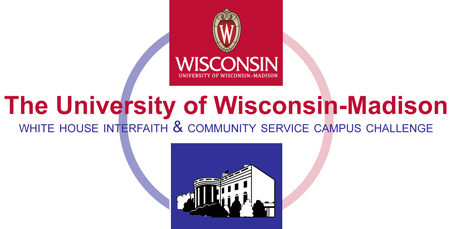Related UW Classes
Chican@ and Latin@ Studies 330, “Community-based Action Research in Social Justice”
Offered in partnership with the Multicultural Student Center. The course involves students in the goals of 1) building social justice analysis drawn from contemporary movement and organizing contexts; 2) training in community-based action research methodologies that can be applied to community organizing and justice work; and 3) participating in group research projects that support the work of on-ground campus and community social justice efforts. In 2011 the course will contain modules that explicitly help participants to connect social justice work with ongoing theological and religious praxes.
Environmental Studies 126, “Principles of Environmental Studies”
Coupled with ES 199, “The Intersection of Science, Praxis and Ethics,” Prof. Cal DeWitt. The course proceeds from a science-ethics-praxis framework, integrating these three areas and engaging students in service so that they may become better citizens of the biosphere as well as responsible and effective leaders. Students work with community partners on environmentally-related issues. The interfaith component includes weekly reflection sessions, held at The Lounge@Pres House, in which students discuss the impact, meaning and outcomes of their work from both scientific and ethical perspectives.
Religious Studies 234, “Genres of Western Religious Writing”
Dr. Eric Carlsson. The course
introduces students to a range of texts from the Jewish, Christian, and Muslim traditions from
antiquity to the modern world. It concludes by exploring relationships and tensions between
religious tradition and personal identity through the twentieth century.
Religious Studies 273, “Asian Religions in Global Perspective”
Prof. Anne Hansen. The
course introduces students to religious histories and cultures in Asia, including Islam,
Buddhism, Hinduism, and Confucianism. It examines how religious people and communities
have responded to experiences of suffering and oppression, and how these religious responses have opened up possibilities for transformation in themselves and others.
Religious Studies 400, Topics in Religious Studies [Humanities]: “The Basis for Dialogue between Jews, Christians and Muslims”
Rev. Ulrich Rosenhagen. Using Rabbi Bradley Hirschfield’s book, You Don’t Have to Be Wrong for Me to Be Right: Finding Faith Without Fanaticism, as a starting point, students explore the basis for dialogue between Jews, Christians, and Muslims. Among other topics, the course examines historic examples of coexistence between Jews, Christians, and Muslims, introduces key concepts of religious dialogue, and locates contemporary attempts by Jewish, Christian and Muslim communities to engage in religious dialogue. The seminar includes an interreligious service project.


